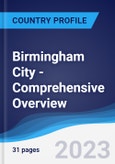The report contains detailed tourism, retail, construction, technology and public infrastructure data and insight into economic, social, and industry trends.
Birmingham is the third-biggest city in the UK in terms of area and is part of the Birmingham metropolitan region. The city contributed 1.4% of the country’s GDP in 2022. The city thrives on advanced manufacturing, professional services, digital technologies, and life sciences, driving business investments.
Scope
- The service sectors remain the key contributors to the regional economy - and the major employers.
- Birmingham is one of the key tourist destinations in the United Kingdom for both domestic and international tourists. The city's prominence is bolstered by initiatives like the Business and Tourism Programme (BATP), leveraging the global exposure of events like the Birmingham 2022 Commonwealth Games to drive economic growth through tourism and investment.
- The construction sector in Birmingham city plays a pivotal role, contributed 5.0% to Birmingham's total GVA in 2022. It's poised for further growth, backed by infrastructure projects like HS2 and major developments such as the Birmingham Smithfield Mixed-Use Development and the Longbridge Regeneration project.
Reasons to Buy
- Gain a comprehensive knowledge of future economic and demographic trends and understand the performance of various sectors within the city.
- Analyze and understand the business environment in the city to align your investment and expansion strategies.
- The report helps to drive a conclusion in choosing a suitable city to invest or expand according to your business structure.
- Explore new opportunities in the hospitality, tourism, construction, real estate and retail sectors.








